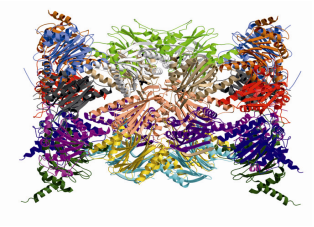Research focus of the Basler lab (under construction)
1) The inhibition of the immunoproteasome as therapeutic approach against autoimmunity and cancer
The immunoproteasome is a large cylindrical complex in immune cells in which porteins are degraded to peptides (Fig. 1). So far the immunoproteasome had been shown to be involved in the fragmentation of antigens for the stimulation of cytotoxic T lymphocytes.

Fig. 1: Crystal structure of the mouse immunoproteasome [from Huber et al. (2012) Cell 148:727-738].
In 2009 we have discovered a new function of the immunoproteasome in the development of pro-inflammatory T helper lineages (Th1, Th17) and cytokines (IL-6, IFN-gamma, IL-23, TNF, see Muchamuel et al. (2009) Nature Medicine 15:781-787). These T helper cells and cytokines are critically involved in the pathogenesis of autoimmune diseases. We could show that an inhibitor of the immunoproteasome subunit LMP7 protected from the development and exacerbation of several autoimmune diseases (multiple sclerosis, inflammatory bowel disease, rheumatoid arthritis) in preclinical models. Moreover, the development and progression of colon carcinoma could beآ blocked with immunoproteasome inhibition. Based on our research, several pharmaceutical companies have developed novel immunoproteasome inhibitors that are currently tested in clinical trials as therapeutics against autoimmune diseases.
Selected publications from this project:
- Li, J., Koerner, J., Basler, M., Brunner, T., Kirk, C. J., and Groettrup, M. (2019) Immunoproteasome inhibition induces plasma cell apoptosis and preserves kidney allografts by activating the unfolded protein response and suppressing plasma cell survival factors. Kidney Int., 95:611-623.
- Schmidt, C., Berger, T., Groettrup, M., and Basler, M. (2018) Immunoproteasome inhibition impairs T and B cell activation by restraining ERK signaling and proteostasis. Front. Immunol. 9:2386.
- Basler, M., Lindstrom, M. M., LaStant, J. J., Bradshaw, J. M., Owens, T. D., Schmidt, C., Maurits, E., Tsu, C., Overkleeft, H. S., Kirk, C. J., Funk, J. O., Langrish, C. L., and Groettrup, M. (2018) Co-inhibition of immunoproteasome subunits LMP2 and LMP7 is required to block autoimmunity. EMBO reports 19, doi: 10.15252/embr.201846512.
- Basler, M., Mundt, S., and Groettrup, M. (2018) The immunoproteasome subunit LMP7 is required in the thymus for filling up a hole in the T cell repertoire. Eur. J. Immunol. 48: 419-429.
- Koerner, J., Brunner, T., and Groettrup, M. (2017) Inhibition and deficiency of the immunoproteasome subunit LMP7 suppress the development and progression of colorectal carcinoma in mice. Oncotarget. doi: 10.18632/oncotarget.15141.
- Basler M*, Mundt S*, Muchamuel T*, Moll C, Jiang J, Groettrup M, Kirk CJ. (2014) Inhibition of the immunoproteasome ameliorates experimental autoimmune encephalomyelitis. EMBO Mol Med 6(2):226-238.
- Basler M, Kirk CJ, Groettrup M. (2013) The immunoproteasome in antigen processing and other immunological functions. Curr Opin Immunol, 2013;25(1):74-80.
- Huber EM*, Basler M*, Schwab R, Kirk CJ, Heinemeyer W, Groettrup M, and Groll M. (2012). Immuno- and Constitutive Proteasome Crystal Structures Reveal Differences in Substrate and Inhibitor Specificity. Cell: 148(4), 727-738.
- Kalim KW, Basler M, Kirk CJ, Groettrup M. (2012). - Immunoproteasome subunit LMP7 deficiency and inhibition suppresses Th1 and Th17 but enhances regulatory T cell differentiation J Immunol 189(8):4182-4193.
